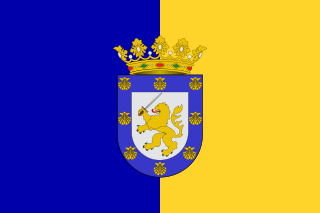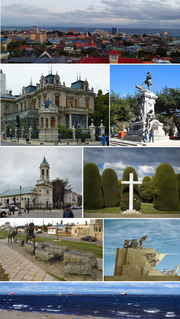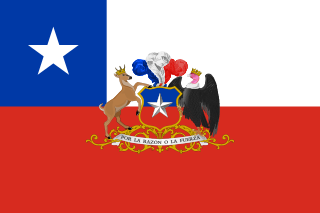| Pareuxoa luteicosta | |
|---|---|
| Scientific classification | |
| Kingdom: | |
| Phylum: | |
| Class: | |
| Order: | |
| Family: | |
| Genus: | |
| Species: | P. luteicosta |
| Binomial name | |
| Pareuxoa luteicosta Angulo & Olivares, 1999 | |
Pareuxoa luteicosta is a moth of the family Noctuidae. It is found in the Maule Region of Chile.
The wingspan is about 32 mm. Adults are on wing from January to March.

Chile, officially the Republic of Chile, is a country in the western part of South America. It occupies a long, narrow strip of land between the Andes to the east and the Pacific Ocean to the west. Chile covers an area of 756,096 square kilometres (291,930 sq mi), with a population of 17.5 million as of 2017. Chile is the southernmost country in the world, the closest to Antarctica, and borders Peru to the north, Bolivia to the northeast, Argentina to the east, and the Drake Passage in the far south. Chile also controls the Pacific islands of Juan Fernández, Isla Salas y Gómez, Desventuradas, and Easter Island in Oceania. It also claims about 1,250,000 square kilometres (480,000 sq mi) of Antarctica under the Chilean Antarctic Territory. The country's capital and largest city is Santiago, and its national language is Spanish.

South America is a continent entirely in the Western Hemisphere and mostly in the Southern Hemisphere, with a relatively small portion in the Northern Hemisphere. It can also be described as the southern subregion of a single continent called America. The reference to South America instead of other cultural or geographical regions has increased in recent decades due to changing geopolitical dynamics.

Salvador Guillermo Allende Gossens was a Chilean physician and socialist politician who served as the 28th president of Chile from 3 November 1970 until his overthrow and suicide on 11 September 1973. He was the first Marxist to be elected president in a liberal democracy in Latin America.

Santiago, also known as Santiago de Chile, is the capital and largest city of Chile as well as one of the largest cities in the Americas. It is the center of Chile's most densely populated region, the Santiago Metropolitan Region, whose total population is 8 million, of which more than 6 million live in the city's continuous urban area. The city is entirely in the country's central valley. Most of the city lies between 500–650 m (1,640–2,133 ft) above mean sea level.

Patagonia refers to a geographical region that encompasses the southern end of South America, governed by Argentina and Chile. The region comprises the southern section of the Andes Mountains, lakes, fjords, and glaciers in the west and deserts, tablelands and steppes to the east. Patagonia is bounded by the Pacific Ocean on the west, the Atlantic Ocean to the east, and many bodies of water that connect them, such as the Strait of Magellan, the Beagle Channel, and the Drake Passage to the south.

The chili pepper, from Nahuatl chīlli, is the berry-fruit of plants from the genus Capsicum which are members of the nightshade family, Solanaceae. Chili peppers are widely used in many cuisines as a spice to add pungent 'heat' to dishes. Capsaicin and related compounds known as capsaicinoids are the substances giving chili peppers their intensity when ingested or applied topically. Although this definition would technically include bell peppers, in common language they are often two discrete categories: bell peppers and chili peppers.

The Mapuche are a group of Indigenous inhabitants of present-day south-central Chile and southwestern Argentina, including parts of present-day Patagonia. The collective term refers to a wide-ranging ethnicity composed of various groups who shared a common social, religious, and economic structure, as well as a common linguistic heritage as Mapudungun speakers. Their influence once extended from Aconcagua Valley to Chiloé Archipelago and later spread eastward to Puelmapu, a land comprising part of the Argentine pampa and Patagonia. Today the collective group makes up over 80% of the indigenous peoples in Chile, and about 9% of the total Chilean population. The Mapuche are particularly concentrated in the Araucanía region. Many have migrated from rural areas to the cities of Santiago and Buenos Aires for economic opportunities.

The University of Chile is a public university in Santiago, Chile. It was founded on November 19, 1842 and inaugurated on September 17, 1843. It is the oldest and the most prestigious in the country. It was established as the continuation of the former colonial Royal University of San Felipe (1738), and has a rich history in academic, scientific and social outreach. The university seeks to solve national and regional issues and to contribute to the development of Chile. It is recognized as one of the best universities in Latin America for its leadership and innovation in science, technology, social sciences, and arts through the functions of creation, extension, teaching, and research.

The 1973 Chilean coup d'état was a military coup in Chile that deposed the Popular Unity government of President Salvador Allende. On 11 September 1973, after an extended period of social unrest and political tension between the opposition-controlled Congress and the socialist President, as well as economic war ordered by U.S. President Richard Nixon, a group of military officers led by General Augusto Pinochet seized power in a coup, ending civilian rule.

The Chile national football team represents Chile in men's international football competitions and is controlled by the Federación de Fútbol de Chile which was established in 1895. The team is commonly referred to as La Roja. Chile have appeared in nine World Cup tournaments and were hosts of the 1962 FIFA World Cup where they finished in third place, the highest position the country has ever achieved in the World Cup.

The Chamber of Deputies is the lower house of Chile's bicameral Congress. Its organisation and its powers and duties are defined in articles 42 to 59 of Chile's current constitution.

Verónica Michelle Bachelet Jeria is a Chilean politician who has served as United Nations High Commissioner for Human Rights since 2018. She also previously served as President of Chile from 2006 to 2010 and 2014 to 2018 for the Socialist Party of Chile; she is the first woman to hold the Chilean presidency and the first elected female leader in South America. After leaving the presidency in 2010 and while not immediately reelectable, she was appointed the first executive director of the newly created United Nations Entity for Gender Equality and the Empowerment of Women. In December 2013, Bachelet was reelected with over 62% of the vote, bettering the 54% she obtained in 2006. She was the first President of Chile to be reelected since 1932.

The Chilean Navy is the naval warfare service branch of the Chilean Armed Forces. It is under the Ministry of National Defense. Its headquarters are at Edificio Armada de Chile, Valparaiso.

The Communist Party of Chile is a communist party in Chile. It was founded in 1912 as the Socialist Workers' Party and took its current name in 1922. The party established a youth wing, the Communist Youth of Chile, in 1932.

Miguel Juan Sebastián Piñera Echenique OMCh is a Chilean billionaire businessman, politician, president of Chile from 2010 to 2014 and since 2018.

Punta Arenas is the capital city of Chile's southernmost region, Magallanes and Antartica Chilena. The city was officially renamed as Magallanes in 1927, but in 1938 it was changed back to "Punta Arenas". It is the largest city south of the 46th parallel south, and at the same time the most populous southernmost city in Chile and in the Americas, and due to its location, the coldest coastal city with more than 100,000 inhabitants in Latin America. It is also one of the most populous sites so far south in the world.

The president of Chile, officially known as the President of the Republic of Chile is the head of state and head of government of the Republic of Chile. The president is responsible for both the Government of Chile and state administration. Although its role and significance has changed over the history of Chile, as well as its position and relations with other actors in the national political organization, it is one of the most prominent political figures. It is also considered one of the institutions that make up the "Historic Constitution of Chile", and is essential to the country's political stability.

Augusto José Ramón Pinochet Ugarte was a Chilean Army General who ruled Chile from 1973 to 1990, first as the leader of the Military Junta of Chile from 1973 to 1981, being self-declared President of the Republic by the junta in 1974 and becoming the de facto dictator of Chile, and from 1981 to 1990 as de jure President after a new Constitution, which confirmed him in the office, was approved by a referendum in 1980.

The Atacama Desert is a desert plateau in South America covering a 1,600 km (990 mi) strip of land on the Pacific coast, west of the Andes Mountains. The Atacama Desert is the driest nonpolar desert in the world, as well as the only true desert to receive less precipitation than the polar deserts and the largest fog desert in the world. Both regions have been used as experimentation sites on Earth for Mars expedition simulations. According to estimates, the Atacama Desert occupies 105,000 km2 (41,000 sq mi), or 128,000 km2 (49,000 sq mi) if the barren lower slopes of the Andes are included. Most of the desert is composed of stony terrain, salt lakes (salares), sand, and felsic lava that flows towards the Andes.

General elections were held in Chile on 21 November 2021, including presidential, parliamentary and regional elections. A second round of the presidential election was held in Chile on 19 December.